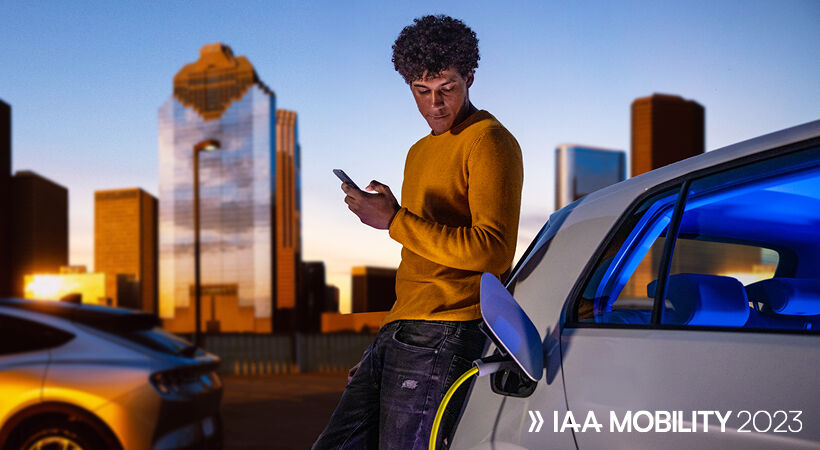How will our cities change with smart traffic management, self-driving vehicles, and shared mobility? Become part of this exciting discussion – at the IAA MOBILITY 2023!
Perhaps you sense it already: Urban spaces will change radically with smart vehicles and connected infrastructure. Today, users of sharing services are already communicating with vehicles and the provider via their smartphones. But very soon, scooters or cars will also be exchanging data with one another in real time. Using weather data to determine the risk of ice on the roads. Or automatically giving priority to pedestrians at a smart traffic light.
That way, the smart city can prevent accidents, buffer energy peaks in the electricity grid, or eliminate traffic jams. New York, for instance, could reclaim an area the size of six Central Parks using shared mobility, if fewer vehicles required parking space, predicts Ingmar Schäfer, mobility expert with Boston Consulting Group (BCG). But how are we going to handle the wealth of data, if - as predicted - in just three years’ time 75 billion devices worldwide are connected? What is 5G delivering? Is 6G coming soon? And how precisely will infrastructure, road users and providers communicate with one another in future?
The answers to these questions are being found by experts such as Cristiano Amon, CEO of Qualcomm, at the IAA MOBILITY. The wireless entrepreneur is convinced that 5G is driving connectivity forward. Vehicles are set to be part of the Internet of Things soon, he says. They will then be comprehensively connected, and would be in constant exchange with their surroundings. Manufacturers, along with third-party providers, could use the data this generates for new business models. Beyond that, emergency responses could also be coordinated digitally, alongside energy consumption, air quality, traffic flows or street lighting.
That sounds very promising. But when will the dream of autonomous driving become a reality? Hasan Al Hosani, CEO of Bayanat, a service provider for geodata intelligence, has a clear answer to that. Artificial intelligence still needs some time: “Artificial Intelligence learns every day, it works with the environment and therefore becomes more accurate. In order to optimize the value derived from artificial intelligence, we must increase the number of autonomous systems in our environment.”
The change to the smart city is thus simultaneously a challenge and an opportunity. We therefore warmly invite you to become part of the IAA MOBILITY 2023 with your project. Together with other experts, shape the spaces of tomorrow! Whether as an architect, an urban planner or software company, an academic institute, or a political body – there are many possibilities for participating in the IAA MOBILITY 2023.
We’re looking forward to seeing you!
Become an exhibitor, sponsor, speaker, or partner at the biggest mobility event in 2023 now.





